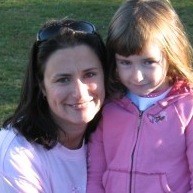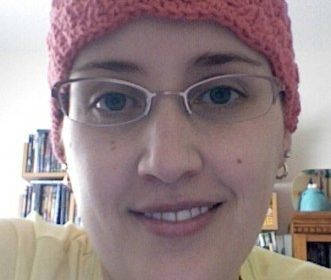
Diane Spencer
Current Age (at time of profile): 37
Hometown
Bridgewater, NS
How did you find out you were sick? What events led to the diagnosis?
I felt a lump in my breast while doing a self-breast exam in the shower. I was pregnant at the time and when I voiced my concerns to my OB/GYN, she examined me and decided the lump was a clogged milk-duct. Months later, at my six-week post-delivery check-up, I causally mentioned the lump to her again. She immediately sent me to see a surgeon, who reassured me it was very unlikely to be anything serious . I had an ultrasound instead of a mammogram because I was breastfeeding my newborn. The ultrasound showed the tumor appeared fluid-filled, but a core-biopsy revealed a very rare form of breast cancer.
What year was it? What was your age at the time?
July, 2001. I was 30 years old at the time.
At what level of education were you at diagnosis?
I had just started my Master of Education in Literacy Education, and was on Maternity Leave from my full-time teaching job.
Do you work? Yes.
What was your diagnosis?
Mucinous Carcinoma of the breast, Stage I.
What are your career goals?
To continue teaching and move into Administration within the next five years.
What were your first thoughts when diagnosed?
My first thoughts were that I couldn’t possibly have cancer, I had a baby.
How did your family react?
My family was supportive, but they couldn’t believe I had cancer. I was the healthy one.
How did your friends react?
My best friend did not pretend to know what to say. She came to the hospital, brought me little treats and remained positive all the time. She listened when I needed her to and tried to understand. She was a sounding-board for my major decisions (ie. mastectomy vs. lumpectomy). I also had a group of friends from work who brought meals to my house when they knew I was very sick. My best friends and some co-workers have helped me raise money for both the Run for the Cure and the Relay for Life for years. Their support is awesome.
What did your treatment consist of?
Medical Side: I had a lumpectomy in July 2001, and because the tumor had an unclear margin, I decided to have a radical mastectomy in August 2001. A lumpectomy involved six weeks of radiation at a centre 200 kms away, which I simply could not do. I was also very afraid there might be more cancer in the breast tissue, so the decision wasn’t as horribly sad as it sounds. Because I was having surgery in my small, rural community of Bridgewater, I was fortunate enough to have immediate TRAM reconstruction following my mastectomy. The O.R. was closed for the day, as three surgeons removed my breast tissue and reconstructed a new breast out of fatty tissue and muscle from my abdomen in a six-hour surgery. I developed a staph infection within a week at the surgery site that, fortunately, responded well to intravenous antibiotics.
A month later, I met my oncologist for the first time. He suggested I could have four cycles of A/C chemotherapy to destroy any residual cells and I took him up on his offer. I started chemo after Thanksgiving weekend, 2001, and finished my last round the week before Christmas without any serious problems. In January 2002, I started my five years of Tamoxifen hormone therapy, finishing in early 2007.
In which hospital(s) were you treated?
I received all treatment at the South Shore Regional Hospital, Bridgewater, Nova Scotia. My oncologist hangs out at the Nova Scotia Cancer Centre in Halifax.
What is your current medical status?
Seven-and-a-half years later, I have not had a recurrence of cancer.
How is life different for you now post diagnosis (physically, emotionally, socially, spiritually)?
Physically, I am stronger now than I have ever been in my life. I joined our local boxing club, so I can literally kick cancer’s ass. It hasn’t been an easy road, though. Chemotherapy was hard on my body and hormone therapy caused arthritis and bone pain, which happily lessened and eventually stopped when I came off Tamoxifen. I wear a bikini at the beach knowing no one would ever guess I’d had a mastectomy.
Emotionally, it was a tough seven years. My marriage slowly fell apart as my husband was unable to deal with the diagnosis and subsequent treatment. Since our separation, 18 months ago, life has been much better. I’m now in a relationship with a very supportive and understanding man. I feel very lucky.
Socially, not a lot changed for me as a result of the cancer. Through my cancer journey I have met some incredible people, and I have learned a lot about life from other survivors. This knowledge and friendship is a gift I would not have received otherwise.
What is/was the toughest part of your challenge?
Trying to be a good mother while being so sick and so afraid was very challenging.
What is/was the best part of your challenge?
Being able to help other young women in the years following my diagnosis has been the best part. Hands down.
What really motivated you to keep going while you were sick?
My daughter: newborn at diagnosis and a happy seven-and-a-half year old now.
What lessons or messages have you taken away from your experience?
I am stronger than I thought I was.
What are your thoughts and feelings about your illness now? How have they changed since before your diagnosis?
I think a diagnosis, of any cancer, for anyone is terrifying. I think a diagnosis of breast cancer for a young woman, newly married and starting a family is horrendous. I didn’t think about breast cancer before my illness and my knowledge of the disease was minimal. Now, I think about it all the time.
What are some (if there are any you know of) preventative measures that people can take to lower their risk of having an experience like yours?
Drink less alcohol. Do not smoke. Eat well. Exercise regularly. Turn off your night lights. Have your first baby before you’re thirty. Oh, wait, I did all that. Okay definitely know your breasts. Young women can and do get breast cancer. You know your body best. Check yourself out at least monthly.
Did you attend any support groups during your challenge?
No.
If you did not attend a support group, why?
There were no support groups available in my area and none of my doctors could even give me the name of someone my age who’d had a similar experience. My cancer is so rare it accounts for only 2% of all breast cancers and at my age, my diagnosis accounted for less than 2% of all breast cancer patients (in 2001).
How are you connected with Young Adult Cancer?
My sister-in-law introduced me to Geoff Eaton at a Cancer Survivor Roundtable. I attended Retreat Yourself 2008 in Montreal after having met him because he is super-cool.









